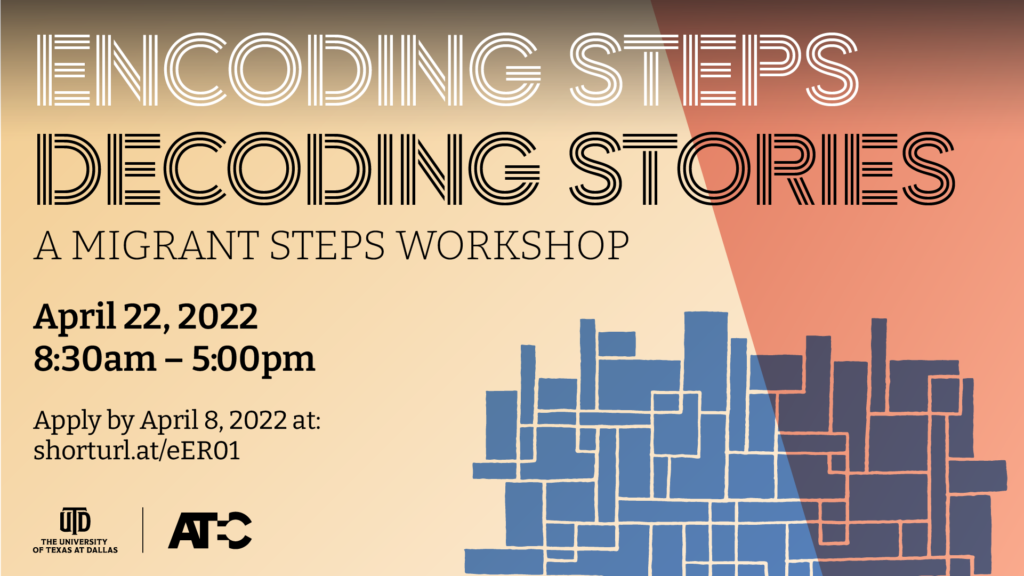
April 22, 2022
8:30am – 5:00pm
We are inviting members of the UTD and DFW community to think with us about the politics of migration narratives and how we connect to those narratives. In this one-day workshop, we will introduce The Migrant Steps Project and work collaboratively through a series of activities designed to address the ethical, technical, and logistical aspects of the project. Our goal is to bring together those with interests in Latinx studies, border studies, media studies, wearable technology, interface design, data visceralization, and digital humanities tied to social issues.
To participate, please fill out a brief application by April 19, 2022 at https://forms.office.com/r/rs2NVFtu6L You will be notified if your registration is accepted no later than April 11, 2022.
Encoding Steps, Decoding Stories is supported by a UT Dallas Workshop grant from the Office of Research and Innovation.
About The Migrant Steps Project
The Migrant Steps Project is conceived as a mobile application, website, and installation that connects daily users of fitness tracking devices to narratives about migration between Central America and the United States. In the course of their daily movements, users of the mobile application will receive haptic feedback that connects their walking, jogging, or other movements to the act of walking in a migrant caravan. By achieving milestones, users gain access to stories and resources that expand and diversify stories about migration currently found in mainstream media. This project intends to intervene in popular narratives about migration, countering media rhetorics of xenophobia and racism, by mobilizing walking as a tool for embodied reflection. It provides users an opportunity to learn more about the conditions of migration, the agency of those migrating, and the community care-work that takes place in this journey while developing creative data literacy by revealing the complexity of data that is messy and refuses easy presentation.
The Migrant Steps Project draws inspiration from the popularity of step tracker applications and the overabundance of migrant narratives in mainstream and social media. The project bridges these two by mobilizing step tracking applications as the point where users come into contact with re-contextualized narratives and popular archives. As an add-on to these applications, the app aims to draw attention and incite critical reflection on the user’s practice of walking as the entry point to engaging with narratives about migration. Migration scholars warn that narratives about migrants often rely on the trope of “flows,” which occludes the essential physical dimension of migration (Pallister-Wilkins). In our previous work Words Matter, we engage critical making to produce installations that encourage audiences to interact and reflect on how language influences our knowledge about a topic. In the project Black Ribbon for Mourning, Knight and collaborators connect the audiences’ bodies to data about police killings of Black persons in the United States, asking users to sit with the data for up to four hours to enact “quantified self-in-kinship.” The Migrant Steps Project draws on these previous works for inspiration. By relying on the user’s walking as the point of interaction with digital narratives about migration, the project will draw attention to the physical dimension of migration and to the importance of words and concepts to making sense of social phenomena.
The Migrant Steps Project is currently supported by a UT Dallas Proposal Resubmission Program grant.
Project Personnel
Co-Principal Investigators: ATEC Critical Media Studies professors Kim Brillante Knight and Juan Llamas-Rodriguez.
The Humanities project team: Mohammed Mizanur Rashid (lead); Nusrat Chowdhury, Fiona Haborak, Luke Hernandez, Karla Michelle del Angel Peyrano and Kasif Rahman.
The Technical project team: Atanur Andic and Talia Devanadero (co-leads); Nishanshi Shukla.
External advisors:
- Sumita Chakravarty, Associate Professor of Media Studies at The New School;
- Linda Garcia-Merchant, US Latino Digital Humanities Postdoctoral Fellow at Arte Publico;
- Lorena Gautherau, Digital Programs Manager for the US Latino Digital Humanities program at the University of Houston’s Recovering the US Hispanic Literary Heritage.
